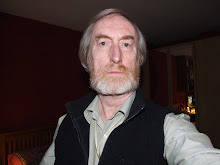This was a first for me: a matinee performance. I can do this because I'm retired, so I guess I can claim to be a matinee idle. (In Glasgow, 'idle' means unemployed. People who are unemployed can be as active and as industrious as they like, they will still be called 'idle'. A Glaswegian can say that someone is working hard down their allotment because they're idle, without any hint of irony at all.)
Which got me on a lunchtime train, in among lots of nice ladies going to visit their grandchildren, or their lovers, or perhaps other matinees. I followed one into the tube station at Charing Cross, only half thinking about where I was going. Of course, there are two tube stations at Charing Cross, and I had got myself into the wrong one. A quick bit of replanning got me, via the Bakerloo, onto the Picadilly line to Baron's Court (Who needs the TfL planner, Eh?)
I don't think I've ever been to Baron's Court before. It is an area of, I believe the expression is, 'faded glory'. It still has the Queen's Club, but, on the other hand, there were tall, porticoed houses, with balustraded balconies, sporting up to 10 bells on the front door.
I was looking for a pub called, appropriately, The Curtains Up (I guess that ought to have an apostrophe). I had used MultiMap to figure out how to get there from the tube station: it now provides Microsoft Virtual Earth, so it's possible to have a bird's eye view of the actual buildings. There was no doubting which was the pub.
It sold a good pint of Adnam's. But the 'Lunch Club' offer of a sandwich and a drink required me to have wine or Fosters, so I had to remind myself how much I dislike the world's most popular lager. The till kept telling me that the barman was called 'Rodrigo', but he certainly didn't look the part. He later admitted that it was a nome-de-guerre which he had inherited.
The theatre, somewhat unusually, is downstairs in the cellar. In fact, you get to it through a door marked 'Toilets'. I wondered if that might be a criticism.
Both these plays are by Peter Shaffer, so high standards were to be expected. 'White Lies' was really rather cleverly constructed, and well played. It reminded us that most of what we know about others is what they tell us about themselves; and how third parties complicate that. Of course, I knew all that already, but I still enjoyed it.
The cellar is a bit hot of an afternoon, so the interval saw me out for a breath of air. There was a Transit van parked outside: not white, but tapestry coloured. It called itself FineCellWork, and claimed to train prisoners in fine needlework. I couldn't help thinking that however difficult that was to do, it must be almost impossible to get started. In fact, the more I think about it, the more it sounds like a sitcom. There was also a cyclists' road sign saying 'ulna n B'w'. Could that, I wondered, be Gaelic?
'Black Comedy' is a rough-and-tumble farce. It amounts, broadly, to a party with the lights fused. None of the characters can see any of the others, except when matches or lighters are used. You can see straight away, that this produces a staging difficulty: how to let the audience see what's going on. Roughly speaking, we had to get used to the lights being off when they were on, and on when they were off; quite a challenge for an audience. And the cast had the added difficulty of bumbling about in the dark without banging into each other in the rather intimate space provided. But we all managed to get up-to-speed in no time at all, and it worked reasonably well. And was rather fun.
And then out, blinking into the afternoon sun, which is one of the drawbacks of matinee. I decided to investigate the cyclists' sign. Close inspection using various angles of reflected light revealed that it used to say 'Fulham B'wy': how disappointing. As I walked back along the Baron's Court Road, I saw a blue plaque telling me that Sir Geoffrey deHavilland, aeronautical engineer, had once lived there. His name had figured large in my boyhood fascination with aeroplanes.


No comments:
Post a Comment